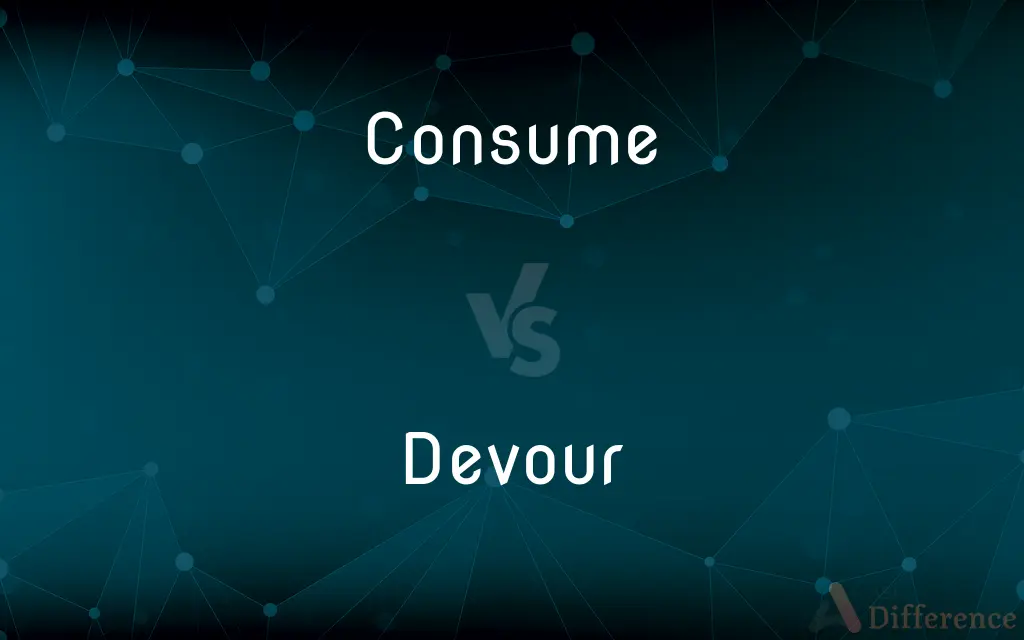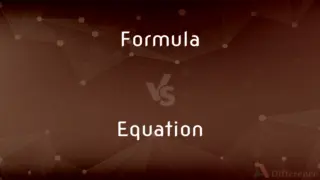Consume vs. Devour — What's the Difference?
By Tayyaba Rehman & Fiza Rafique — Updated on May 6, 2024
Consume generally means to use up resources or food, often at a normal pace; devour implies consuming something eagerly or voraciously, usually quickly.

Difference Between Consume and Devour
Table of Contents
ADVERTISEMENT
Key Differences
Consume is a broader term that encompasses the use of food, energy, or resources, often indicating the act of using these up over a period of time. In contrast, devour specifically refers to eating something greedily or hungrily, with a connotation of doing so quickly and completely.
When someone consumes food, it can be a neutral or even slow process, not necessarily driven by intense hunger. On the other hand, to devour suggests a strong desire and urgency, emphasizing a more intense and rapid eating experience.
Consume can also be used metaphorically to refer to the utilization of non-tangible things like time or energy, where the focus is on the act of using rather than the manner of use. Devour, however, when used metaphorically, carries an implication of consuming with passion or insatiable appetite, such as devouring a book, meaning to read it with intense engagement.
In the context of consumer behavior, to consume means to purchase and use goods and services, reflecting a regular economic activity. Whereas to devour does not typically apply to consumer behavior in the economic sense, remaining more closely tied to the context of consumption driven by necessity or desire.
The emotional connotation of consume is usually neutral, relating simply to the act of using something. Devour often carries a more dynamic, sometimes even aggressive connotation, suggesting a powerful and overwhelming engagement with whatever is being consumed.
ADVERTISEMENT
Comparison Chart
General Meaning
To use up or eat.
To eat greedily or voraciously.
Speed
Can be slow or moderate.
Usually rapid.
Emotional Connotation
Neutral or practical.
Eager, intense, sometimes aggressive.
Usage Beyond Eating
Yes (e.g., energy, resources).
Less common, mostly metaphorical.
Implication of Desire
Not necessarily present.
Strongly implied.
Compare with Definitions
Consume
To eat or drink something.
She consumed a small salad for lunch.
Devour
To read or absorb something eagerly.
She devoured the latest novel in one night.
Consume
To use up resources or energy.
The machine consumes a lot of electricity.
Devour
To consume destructively.
The locusts devoured the crops in the field.
Consume
To absorb or engage wholly.
He was consumed by his work.
Devour
To eat something rapidly and greedily.
He devoured the hamburger in minutes.
Consume
To spend (money).
She consumes most of her income on rent and groceries.
Devour
To engulf or swallow up.
The flames quickly devoured the house.
Consume
To destroy or waste.
The fire consumed the old barn.
Devour
To waste or destroy.
The illness devoured his health.
Consume
To take in as food; eat or drink up.
Devour
Eat (food or prey) hungrily or quickly
He devoured half of his burger in one bite
More and more green space has been devoured by new sprawling estates
Consume
To expend; use up
Engines that consume less fuel.
A project that consumed most of my time and energy.
Devour
To eat up greedily.
Consume
To purchase (goods or services) for direct use or ownership.
Devour
To destroy, consume, or waste
Flames devoured the structure in minutes.
Consume
To waste; squander.
Devour
To take in eagerly
Devour a novel.
Consume
To destroy totally; ravage
Flames that consumed the house.
A body consumed by cancer.
Devour
To preoccupy or obsess in a harmful way
Was devoured by jealousy.
Consume
To absorb; engross
Consumed with jealousy.
Devour
To eat quickly, greedily, hungrily, or ravenously.
Consume
To purchase economic goods and services
A society that consumes as fast as it produces.
Devour
To rapidly destroy, engulf, or lay waste.
The fire was devouring the building.
Consume
(transitive) To use up.
The power plant consumes 30 tons of coal per hour.
Devour
To take in avidly with the intellect or with one's gaze.
She intended to devour the book.
Consume
(transitive) To eat.
Baby birds consume their own weight in food each day.
Devour
To eat up with greediness; to consume ravenously; to feast upon like a wild beast or a glutton; to prey upon.
Some evil beast hath devoured him.
Consume
(transitive) To completely occupy the thoughts or attention of.
Desire consumed him.
Devour
To seize upon and destroy or appropriate greedily, selfishly, or wantonly; to consume; to swallow up; to use up; to waste; to annihilate.
Famine and pestilence shall devour him.
I waste my life and do my days devour.
Consume
(transitive) To destroy completely.
The building was consumed by fire.
Devour
To enjoy with avidity; to appropriate or take in eagerly by the senses.
Longing they look, and gaping at the sight,Devour her o'er with vast delight.
Consume
To waste away slowly.
Devour
Destroy completely;
Fire had devoured our home
Consume
To trade money for good or services as an individual.
In a materialistic society, individuals are taught to consume, consume, consume.
If you consume this product while in Japan, you may be subject to consumption tax.
Devour
Enjoy avidly;
She devoured his novels
Consume
(transitive) To absorb information, especially through the mass media.
The Internet has changed the way we consume news.
Devour
Eat immoderately;
Some people can down a pound of meat in the course of one meal
Consume
To destroy, as by decomposition, dissipation, waste, or fire; to use up; to expend; to waste; to burn up; to eat up; to devour.
If he were putting to my house the brandThat shall consume it.
Lay up for yourselves treasures in heaven, where neither moth nor rust doth consume.
Let me alone . . . that I may consume them.
Devour
Eat greedily;
He devoured three sandwiches
Consume
To waste away slowly.
Therefore, let Benedick, like covered fire,Consume away in sighs.
Consume
Eat immoderately;
Some people can down a pound of meat in the course of one meal
Consume
Serve oneself to, or consume regularly;
Have another bowl of chicken soup!
I don't take sugar in my coffee
Consume
Spend extravagantly;
Waste not, want not
Consume
Destroy completely;
The fire consumed the building
Consume
Use up (resources or materials);
This car consumes a lot of gas
We exhausted our savings
They run through 20 bottles of wine a week
Consume
Engage fully;
The effort to pass the exam consumed all his energy
Common Curiosities
Can "devour" be used in non-eating contexts?
Yes, it can be used metaphorically, like devouring a book, meaning reading it with great enthusiasm and speed.
Is it appropriate to use "devour" in a formal business meeting?
It depends on the context; using "devour" to describe eating might be too informal, but saying someone devoured details of a report could imply thoroughness and enthusiasm.
Can "consume" relate to emotions?
Yes, one can be consumed with an emotion, like anger or love, meaning it fully occupies their mind and affects their behavior.
Which is more intense, consume or devour?
Devour is more intense, often implying a passionate or voracious approach.
What type of consumption does not fit the term devour?
Regular, everyday consumption of food or goods, without urgency or greed, does not fit the term devour.
What is the basic difference between consume and devour?
Consume refers to using up or eating in general, while devour implies eating very eagerly or quickly.
How does media consumption differ between consume and devour?
Consuming media implies regular viewing or reading, whereas devouring media suggests doing so with great eagerness and involvement.
What emotional undertones does consume carry?
Consume generally carries neutral or practical emotional undertones.
How can businesses use these terms in marketing?
Businesses might use "consume" to discuss general product use, while "devour" could be used to evoke strong desire or satisfaction in advertising.
Does devour imply completion?
Yes, devour often implies that something is completely eaten or thoroughly engaged with.
Can devour be used to describe slow processes?
Typically no, devour suggests a rapid and intense process.
Is devour always negative?
Not necessarily, but it often carries connotations of greediness or excess.
Can both terms apply to the usage of resources?
Consume is more appropriate for discussing resource usage; devour is less commonly used in this context and is more dramatic.
Can someone devour money?
Not literally. Metaphorically, it could mean spending quickly and excessively, but it's a less common usage.
Is it correct to use consume in reference to abstract concepts?
Yes, such as being consumed by guilt or a project.
Share Your Discovery

Previous Comparison
Result vs. Effect
Next Comparison
Formula vs. EquationAuthor Spotlight
Written by
Tayyaba RehmanTayyaba Rehman is a distinguished writer, currently serving as a primary contributor to askdifference.com. As a researcher in semantics and etymology, Tayyaba's passion for the complexity of languages and their distinctions has found a perfect home on the platform. Tayyaba delves into the intricacies of language, distinguishing between commonly confused words and phrases, thereby providing clarity for readers worldwide.
Co-written by
Fiza RafiqueFiza Rafique is a skilled content writer at AskDifference.com, where she meticulously refines and enhances written pieces. Drawing from her vast editorial expertise, Fiza ensures clarity, accuracy, and precision in every article. Passionate about language, she continually seeks to elevate the quality of content for readers worldwide.












































